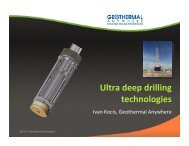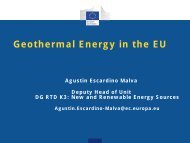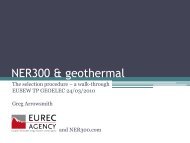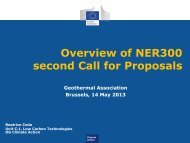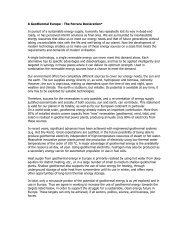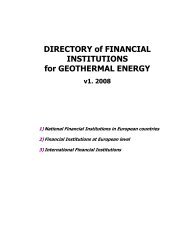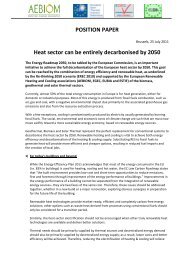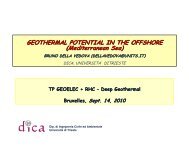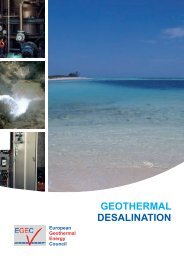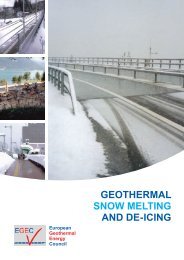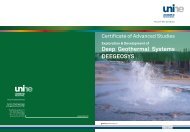Strategic Research and Innovation Agenda for Renewable ... - EGEC
Strategic Research and Innovation Agenda for Renewable ... - EGEC
Strategic Research and Innovation Agenda for Renewable ... - EGEC
You also want an ePaper? Increase the reach of your titles
YUMPU automatically turns print PDFs into web optimized ePapers that Google loves.
10<strong>Strategic</strong> <strong>Research</strong> <strong>and</strong> <strong>Innovation</strong> <strong>Agenda</strong> <strong>for</strong> <strong>Renewable</strong> Heating & CoolingConcluding remarks<strong>Renewable</strong>Heating & CoolingEuropean Technology Plat<strong>for</strong>mReliable, af<strong>for</strong>dable <strong>and</strong> sustainable energy supply is fundamental to the functioningof modern society, to the quality of life of people <strong>and</strong> to the economic growth of Europe. Theuse of renewable energy sources <strong>for</strong> residential, non-residential <strong>and</strong> industrialheating <strong>and</strong> cooling applications is the most effective way to achieve emission reductions <strong>and</strong>to improve energy security.This <strong>Strategic</strong> <strong>Research</strong> <strong>and</strong> <strong>Innovation</strong> <strong>Agenda</strong> responds to the need <strong>for</strong> a detailedanalysis of the priorities <strong>for</strong> <strong>Renewable</strong> Heating <strong>and</strong> Cooling technology to take centre stagein the EU energy policy <strong>and</strong> achieve higher levels of market penetration by 2020<strong>and</strong> beyond. Specific objectives <strong>and</strong> measurable targets are identified <strong>for</strong> each research <strong>and</strong>innovation priority. The technology-specific targets are mostly expressed in termsof cost reduction <strong>and</strong>/or efficiency gain; however the implementation of the RHC-SRA inits entirety requires a systemic approach to produce innovative integrated solutions.Stakeholders of the RHC-Plat<strong>for</strong>m are taking active part in the SET-Plan initiative on SmartCities <strong>and</strong> Communities which promises to effectively support the development of theintegrated RHC solutions which are sought by civil society. The success of the Smart CitiesInitiative depends on the energy portfolio that will be created, which in turn needs to relyon careful urban planning. The adoption of relevant energy efficiency measures shouldgo h<strong>and</strong>-in-h<strong>and</strong> with the demonstration of new renewable heating <strong>and</strong> cooling projects.With the RHC-SRA, a comprehensive strategy has been put <strong>for</strong>ward to support thedecarbonisation of the heating <strong>and</strong> cooling sector in the EU <strong>and</strong> to provide a framework<strong>for</strong> the European RHC stakeholders to emerge strengthened from the current economicdownturn. <strong>Research</strong> <strong>and</strong> innovation are placed at the heart of the RHC-Plat<strong>for</strong>m’s agendaas our industry competitiveness <strong>and</strong> ability to create new jobs depends on the capacityto further reduce costs <strong>and</strong> to improve the quality of energy applications <strong>and</strong> services.Raising the public-private expenditure <strong>for</strong> RHC research to the average annuallevel close to 0.6 billion Euro is crucial to achieve the full RHC industry potential. To thisend, support is required at the EU level through different funding instruments, first <strong>and</strong><strong>for</strong>emost HORIZON 2020 which should dedicate to RHC R&D the attention <strong>and</strong> resourcesthe sector deserves.Private investors look <strong>for</strong> the right signals today – from the EU <strong>and</strong> national governments – tomake Europe a competitive <strong>and</strong> renewable energy economy by 2050. Filling the EU vacuumof climate <strong>and</strong> energy policies <strong>for</strong> the period 2020-2030 is essential in order to reduce bothregulatory risk <strong>and</strong> investors’ uncertainty. Ambitious <strong>and</strong> binding renewable energy targets<strong>for</strong> 2030 are needed to ensure a stable <strong>and</strong> positive investment climate across the EU.<strong>Renewable</strong> heating <strong>and</strong> cooling can provide an important contribution to major societalchallenges, such as climate change, security of supply <strong>and</strong> energy efficiency. Today wemanage to produce 14% of energy <strong>for</strong> heating <strong>and</strong> cooling from RES. But the potentialis vaster: RHC technology could satisfy a quarter of EU consumption by 2020. If we are toachieve our ambitions of decarbonisation <strong>and</strong> market growth, now is the time to worktowards the effective implementation of the RHC-SRA.At the time of publishing, the RHC-Plat<strong>for</strong>m is working on the production of a TechnologyRoadmap <strong>for</strong> <strong>Renewable</strong> Heating <strong>and</strong> Cooling. The Implementation Plan will rely on the in<strong>for</strong>mationprovided in the present publication to propose a set of research, development <strong>and</strong>demonstration projects <strong>for</strong> the period 2014-2020.89



